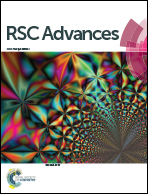The significance of different heating methods on the synthesis of CdS nanocrystals
Abstract
Both microwave and conventional oil bath heating approaches are investigated for the fabrication of CdS nanocrystals through the thermolysis of a single source precursor cadmium diethyldithiocarbamate (CED), which allows us to gain further insight into the thermodynamic aspect of the synthesis. The analysis illustrates that nearly monodispersed sea-urchin-shaped CdS nanocrystals are obtained with the microwave method, whereas nanospheres covered by chunky protuberances are achieved with an oil bath approach. Such experiments suggest that microwave heating facilitates the growth of CdS along the [002] direction. In addition, we explored the catalytic activity of CdS in the photodegradation of rhodamine B, in which the CdS prepared through a microwave approach greatly outperformed that prepared through oil bath heating and the commercial CdS nanoparticles. Such enhancement arises from the higher specific surface area and crystallinity of the sea-urchin-shaped nanocrystals.


 Please wait while we load your content...
Please wait while we load your content...